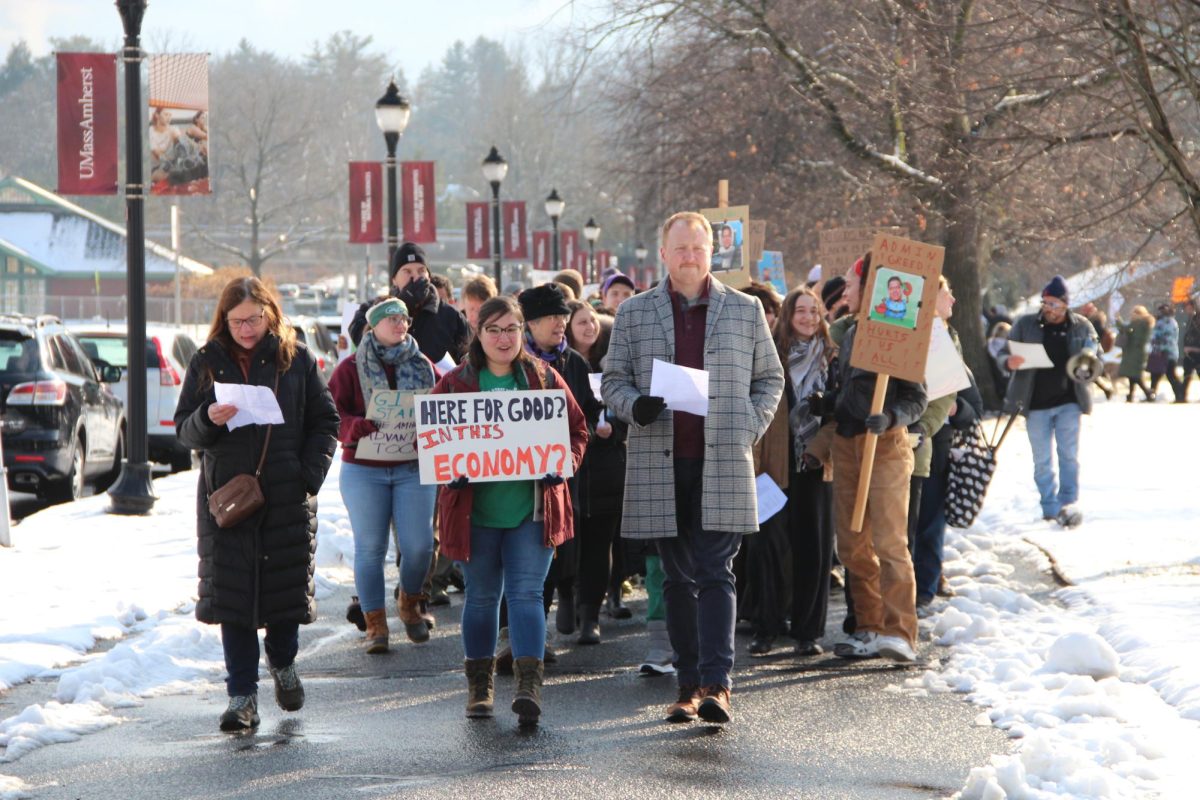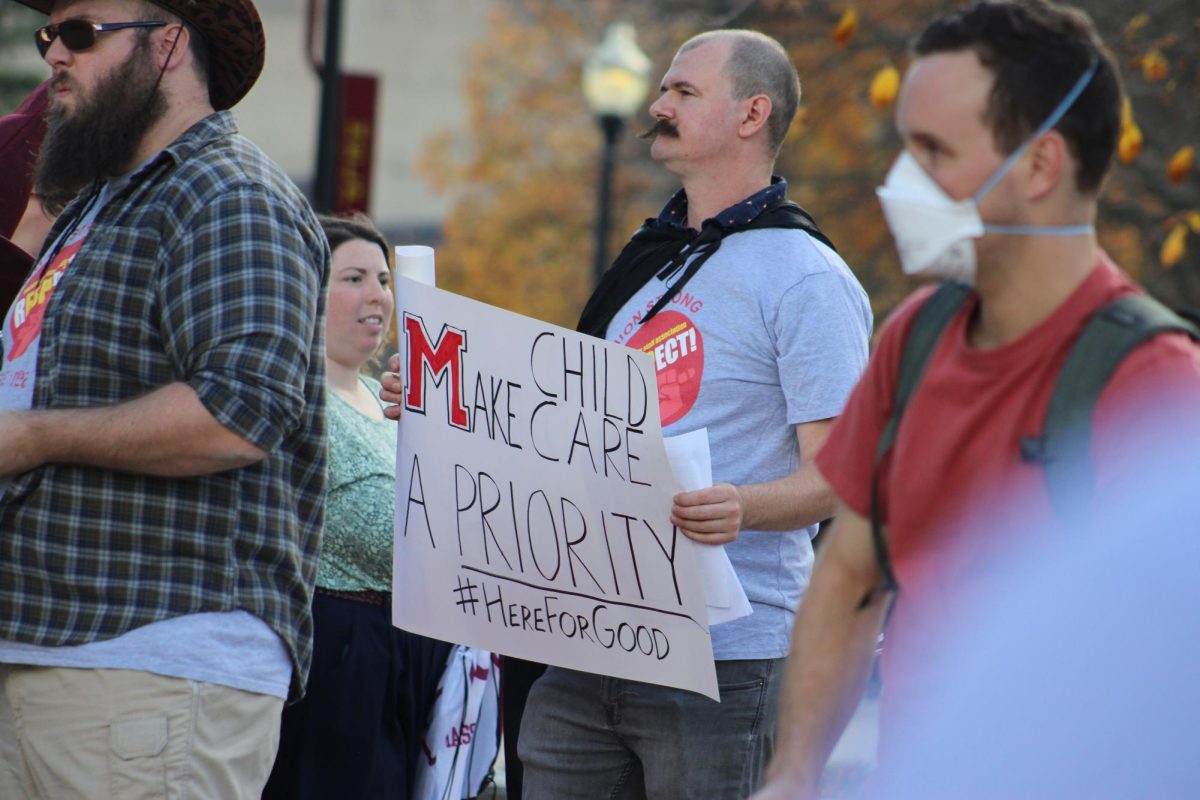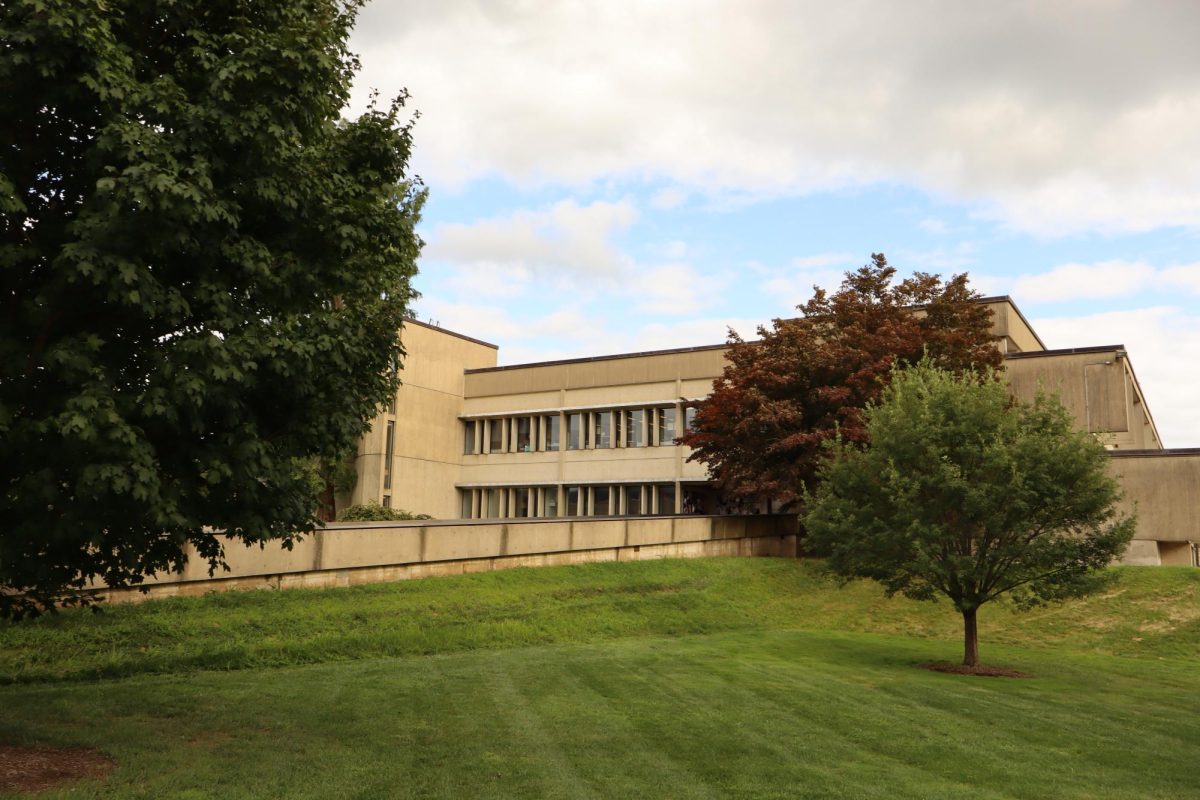With additional reporting by Paige Hanson and Alexandra Rowe
This story has been updated with new information
At the University of Massachusetts, over 130 students, faculty, and community members were arrested during the Gaza solidarity encampment on May 7. Many of the students arrested are now speaking out about the conditions they faced while being arrested.
The UMass Police Department, Massachusetts State Police, and dozens of members of the State Police’s Special Emergency Response Team (SERT) were present during the arrests. Vans from Hampshire County Sheriff’s Office, Amherst Police Department, Hampden County Sheriff’s Office, and Hadley Police Department were also used to transport arrested individuals.
“I have never, never felt more unsafe on this campus, particularly in the encampment, than when I saw police with helmets approaching us,” said Anya Epstein, a sophomore public health and psychology student.
Epstein spoke during a rally for Rafah held on May 8, describing her interaction with police; “I was aggressively arrested by Massachusetts State Police as a clearly marked medic.” Several medical personnel could be seen wearing red crosses made of tape at the encampment.
Students around the encampment watched Epstein’s arrest, like SJP Co-President Ruya Hazeyen, a senior Palestinian student and a political science and Middle Eastern studies major.
“I was in the crowd,” said Hazeyen. She was threatened with pepper sprayed by the police. “They arrested a medic right next to me. They ripped her medic vest off, threw it on the ground, and arrested her,” Hazeyen said.
A common complaint many arrestees had was the tightness of the zip-tied handcuffs the police placed on them.
Malia Cole, a sophomore psychology and STEPC major was part of the jail support team for the arrested students and said “I heard from countless students last night that they suffered severe injuries.”
“Ranging from a loss in circulation from handcuffs [too] tight that [were] held for hours,” continued Cole. “Road rash on their hands, stomachs and legs from being brutally thrown to the ground by cops for peacefully protesting.”
“I have a lot of pain,” said an arrested protester. “I have pain in my shoulders from being zip-tied behind my back for four hours.”
They were at the center of the encampment until being arrested and transported by a University-owned shuttle to the Mullins Center along with dozens of other arrested individuals.
“We were there for a couple of hours. They weren’t letting us use the bathroom…I hadn’t peed for well over twelve hours,” said the arrested protester.
Three arrested community members were founding members of Valley Families for Palestine. Sarah Prager, a founding member of VFP, expressed the conditions that the arrestees were put in while under police custody.
“One of [the arrested parents] asked to change her tampon and was told to deal with it. She had the tampons in her bag, but they wouldn’t let her go,” said Prager.
Prager also said that one VFP arrestee was denied bathroom access for ten hours, and another “was being held so tightly by the elbow, that she had tried to move it, and [the police] had jerked her back in a way that has resulted in an injury to her elbow.”
An arrested VFP member told Prager that while being detained, they “saw a student need to relieve themselves into a bottle for being denied the bathroom, saw bleeding wrists from zip ties tied to tight.”
In a written response to the Daily Collegian, Campus Spokesperson Ed Blaguszewski said; “The UMass Amherst Police Department takes its mission of providing safety and security seriously and fully investigates any complaints that are filed. To date, no allegations of misconduct related to the events of May 7 have been filed.”
Update: During a recent meeting with the Graduate Student Senate, UMPD Police Chief Tyrone Parham said that “just enough force was used to overcome resistance” and that people seem to have different views of what police brutality is.
Hazeyen said; “There were also some cops with their body cams off. I have footage of it.”
The Collegian also reported that some police officers hid their badge numbers and names.
Videos flooded social media on May 7 of several people getting arrested, showing some students yelling profanities at the police officers and being rushed by groups of police officers. The videos also show a large number of students gathered around the encampment to watch as their fellow students, faculty, and community members got arrested.
“[The police] charged at random people in the crowd, one [had] to get hospitalized because they hurt her so bad. I mean, it was a level of violence I have never seen in my life,” said Hazeyen.
At around 9 p.m., a protester was pulled to the ground by officers from the surrounding crowd and arrested. “I did never surround the encampment. I was in the crowd. I was not doing s***. They tackled my a**,” they said before being put in a prisoner transport van.
Dania Rustom, a freshman mathematics and journalism major, said she arrived at the protest around 8:30 p.m. “I was definitely surprised by the amount of people that were there.”
The police announced to the crowd around 8:50 p.m. that there was no allowance for observers or onlookers, declaring an unlawful assembly.
Rustom said that after the encampment had been taken apart, at around 1:30 a.m., the state police who were dressed in riot gear walked from the Student Union lawn to the Old Chapel. “I wanna say there was like 20 or more [police] there, and there were protesters all in front of them, all in front of that line, and then out of nowhere, all the riot police just like attacked the students.”
“I thought that someone was like pushed into the police or something was thrown, but I didn’t see that happen, and none of the videos showed that it just really came out of nowhere,” continued Rustom. “They were just standing in front of the police just protesting…and then out of nowhere, the police just attacked them.”
Rustom believed she saw four arrests happen at that time, adding she saw a man on a bike get tackled by police; “I was right there, and that was like, yeah, most scared I ever was.”
“This is a college campus where we are supposed to be able to practice free speech and our right to protest without having to worry about students getting pepper sprayed and shoved to the floor and tased,” Hazeyen said.
“I just did not feel safe at all,” said Rustom, reiterating that she believed the police instigated all of the violence. “They weren’t ensuring people’s safety, in my opinion.”
Tatiana Rodriguez, an Afro-American studies Ph.D. student, said the rally that police “did not hesitate to use extreme force including pepper spray, [tasering] and physically attacking students who were not resisting.”
The Collegian has been unable to confirm if pepper spray and tasers were used. Police could be seen shining strobe lights at individuals and holding wire cutters and crowbars to break down the encampment.
“Those police officers tackled our friends, our professors, our community members, pressing their faces into the ground, pressing knees into their backs, brutalizing them. Police liaisons and medics were violently arrested.”
At the rally, many student speakers expressed their disappointment and frustration at Chancellor Javier Reyes’ actions.
“I don’t think I have the words to describe the absolute disgust I’m feeling; the Chancellor put his own students at risk. It was completely safe. It was not a riot. It was a protest,” Hazeyen said.
“The events of [May 7th] at UMass Amherst show us that Chancellor Reyes will resort to extreme levels of police violence to silence students’ voices,” Rodriguez said.
Alexandra Hill can be reached at [email protected], Grace Lee can be reached at [email protected].





















